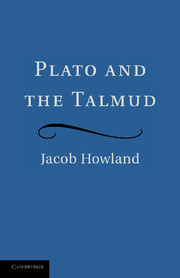Book contents
- Frontmatter
- Contents
- Acknowledgments
- Introduction: Athens and Jerusalem
- 1 Talmudic and Platonic Writing
- 2 Rabbis and Holy Men
- 3 Prophets and Philosophers
- 4 Fathers and Sons
- 5 Words and Deeds
- 6 Gods and Men
- 7 Miracles and Necessity
- Epilogue: Texts and Traditions
- Works Cited
- Index to Biblical and Rabbinic Texts
- General Index
Epilogue: Texts and Traditions
Published online by Cambridge University Press: 10 November 2010
- Frontmatter
- Contents
- Acknowledgments
- Introduction: Athens and Jerusalem
- 1 Talmudic and Platonic Writing
- 2 Rabbis and Holy Men
- 3 Prophets and Philosophers
- 4 Fathers and Sons
- 5 Words and Deeds
- 6 Gods and Men
- 7 Miracles and Necessity
- Epilogue: Texts and Traditions
- Works Cited
- Index to Biblical and Rabbinic Texts
- General Index
Summary
Who is Plato's Socrates? Who are the rabbinic sages? The Platonic dialogues and the Talmud address these questions by mimetically representing the deeds as well as the speeches of these men. By telling stories about their experiences and reproducing their arguments in the form of “live” debate, these texts attempt to give readers a concrete and vivid impression of the inner being of Socrates and the sages. But the rewards of reading the dialogues and the Talmud are commensurate with the efforts of the reader, for only the combined work of logical analysis and literary interpretation can open up the depths of significance in the thoughts and actions represented in these writings.
This book has attempted to answer the two questions just posed by way of a comparative analysis and interpretation of selected Platonic and Talmudic writings. The preceding chapters have brought to light a number of analogies between both the form and the content of Ta'anit 3 and the Euthyphro and Apology. The most important of these fall naturally into three categories: the conceptual and practical spaces in which Talmudic and Socratic inquiry unfold, the main ideas that allow Socrates and the rabbis to negotiate these spaces, and the role of the texts in mediating the reader's relationship to these ideas. While this synoptic framework is too schematic to incorporate every significant detail of the texts we have studied, it will serve to bring into focus the main points of contact between them.
- Type
- Chapter
- Information
- Plato and the Talmud , pp. 253 - 260Publisher: Cambridge University PressPrint publication year: 2010



